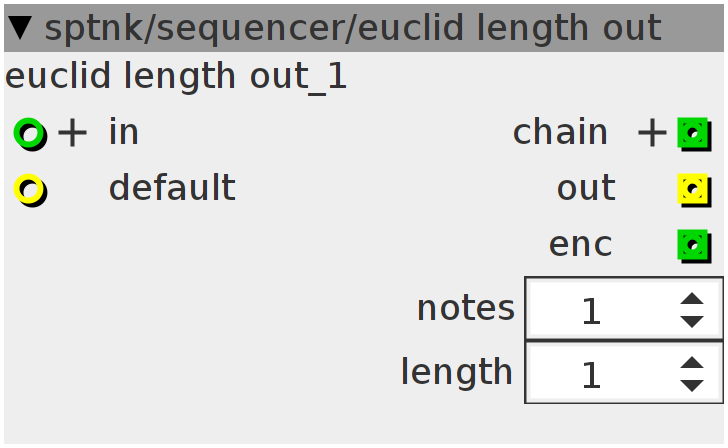euclid length out
Euclidean rhythm generator. Chainable. Notes specifics the number of active steps, length the number of steps of the sequence (maximum sequence length=31). Inlet in specifics what step to read, like sel i 16/32 or disp/ibar . If outside the range the default inlet will be outputted (like said objects). Dynamic algorithm, therefore variable dsp load with different configurations. Additional outlet outputs an integer represention of the current sequence: you can decode the number with multiple logic/decode bin 8 chained
Inlets
int32.positive step select
bool32 default
Outlets
int32.positive chain output
bool32 bool out
int32 encoded output
Parameters
int32 notes
int32 length
Declaration
bool sequence[31];
int powers[31];
Init
for (int i = 0; i < 31; i += 1) {
powers[i] = 1 << i;
}
Control Rate
int notes = param_notes;
if (notes > param_length)
notes = param_length;
int rests = param_length - notes;
outlet_chain = inlet_in - param_length;
if (rests) {
if (notes < rests) {
int mul = rests / notes;
int rem = rests - (mul * notes);
int ii = 0;
int temp;
for (int i = 0; i < notes; i += 1) {
if (i < rem) {
temp = ii;
sequence[ii] = 1;
for (ii = temp + 1; ii < temp + mul + 2; ii += 1)
sequence[ii] = 0;
} else {
temp = ii;
sequence[ii] = 1;
for (ii = temp + 1; ii < temp + mul + 1; ii += 1)
sequence[ii] = 0;
}
}
} else if (notes > rests) {
int mul = notes / rests;
int rem = notes - (mul * rests);
int ii = 0;
int temp;
for (int i = 0; i < rests; i += 1) {
if (i < rem) {
sequence[ii] = 1;
ii += 1;
sequence[ii] = 0;
temp = ii;
for (ii = temp + 1; ii < temp + mul + 1; ii += 1)
sequence[ii] = 1;
} else {
sequence[ii] = 1;
ii += 1;
sequence[ii] = 0;
temp = ii;
for (ii = temp + 1; ii < temp + mul; ii += 1)
sequence[ii] = 1;
}
}
} else {
sequence[0] = 1;
for (int i = 1; i < param_length; i += 1)
sequence[i] = !sequence[i - 1];
}
} else {
for (int ii = 0; ii < param_length; ii += 1)
sequence[ii] = 1;
}
if (inlet_in >= 0 && inlet_in < param_length)
outlet_out = sequence[inlet_in];
else
outlet_out = inlet_default;
int num = 0;
for (int i = 0; i < param_length; i += 1)
num += sequence[i] * powers[i];
outlet_enc = num;